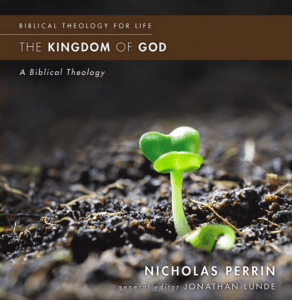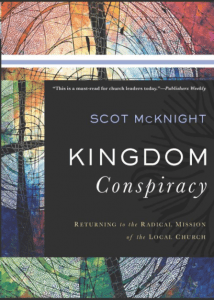The word “kingdom” is perhaps the flabbiest term being used by Christians today. In fact, many who like “kingdom” would rather they not be called “Christians.” This good word of Jesus’, which he inherited from his scriptures and from his Jewish world, has come to mean two wildly different things today: for some it means little more than personal redemption, that is, it means submitting personally to God as your king and Lord. Let’s call this the redemptive kingdom. For yet others it means the ethics connected with the kingdom, that is, it means wherever there is peace, justice, goodness, freedom, liberation … you name it … there is kingdom. Let’s call this the justice kingdom.
 Before I raise my hand and speak from the floor in a way that many simply don’t like, I want to make two things clear: Yes, the kingdom needs to be connected to the redemptive powers at work in this world, and this can be found at times in Jesus’ teachings when he says things like “if it is by the Spirit of God that I drive out demons, then the kingdom of God has come upon you” (Matthew 12:28). And Yes there is an ethical dimension to this term, besides ideas like righteousness and zealous commitment and joy (as in Matthew 13), but also flat-out ethical categories like justice, as in Romans 14:17: “For the kingdom of God is not a matter of eating and drinking, but of righteousness, peace and joy in the Holy Spirit.” So, Yes, it is reasonable to see a redemptive kingdom and a justice kingdom. (The latter has much less support in the language of the Bible.)
Before I raise my hand and speak from the floor in a way that many simply don’t like, I want to make two things clear: Yes, the kingdom needs to be connected to the redemptive powers at work in this world, and this can be found at times in Jesus’ teachings when he says things like “if it is by the Spirit of God that I drive out demons, then the kingdom of God has come upon you” (Matthew 12:28). And Yes there is an ethical dimension to this term, besides ideas like righteousness and zealous commitment and joy (as in Matthew 13), but also flat-out ethical categories like justice, as in Romans 14:17: “For the kingdom of God is not a matter of eating and drinking, but of righteousness, peace and joy in the Holy Spirit.” So, Yes, it is reasonable to see a redemptive kingdom and a justice kingdom. (The latter has much less support in the language of the Bible.)
My beef today is that too many today have abstracted the ethical ideals from Jesus’ kingdom vision, all but cut Jesus out of the picture, and then called anything that is just, peace, good and loving the “kingdom.” The result is this equation: kingdom means goodness, goodness means kingdom. Regardless of who does it. My contention would be that kingdom goodness is done by kingdom people who live under King Jesus. I applaud goodness at large. This is not a question of either or but whether or not all goodness is kingdom goodness. Some say Yes, I say No.
Here’s a really good example and I use this post on a blog because the author sent it to me and because it’s a great example of what we are talking about. I’m not picking on this piece and don’t want this conversation to be about this piece or about what this author says about Steve Jobs. I only want to show how goodness or usefulness and progress in society is sometimes called “kingdom.” In fact, Steve Jobs denied Christianity and was a Buddhist. This guy says Steve Jobs’ contribution to our society was kingdom.
There are hundreds of millions of people who can trace a tangible improvement in their livesdirectly to the labor of this man. In reflecting on that, without adequate mental categories for it, erroneous conclusions abound. Whether one concludes that Steve Jobs was a demigod, or that his life’s work to revolutionize the way people can interact with information was a petty and trivial waste of time, there seems to be a lot of confusion. I decided to write this essay because I think that the reflexive eulogizing of those hundreds of millions of people has roots in something more profound than delusional worship of the creator of the smartphone.
Why did Steve Jobs’s life work strike such a personal chord with so many people? I’d like to suggest that the answer has to do with the kingdom of God….
At the risk of over-simplification, the kingdom of God is the realm where God’s will is done—where things work the way God wants. It requires some vivid imagining for people stuck in a bitterly broken world to conceive of such a kingdom. But if you let your mind roam, you might be able to sketch some outlines. Start with the obvious: no more meaningless suffering, no more inexplicable pain. No more sickness, no more death, perhaps not even any decay. Purpose and meaning are woven into the fabric of all experience. Work is productive. Love is the prevailing character of all interaction. Everything works the way it’s supposed to, for everyone. And at the heart of it all, there is perfect goodness—a person of inexplicable beauty and wisdom and perfection, sustaining the economic, social, physical and spiritual dynamics of all that takes place. In other words, words can’t do it justice, but it’s good.
But what does Steve Jobs’s life have to do with this kingdom? One of the things that Jesus taught was that the kingdom of God was “at hand.” Again, this probably means a lot of things, among them that people are called to participate in bringing the kingdom of God with us, “on earth as it is in heaven.” To labor with the goal of making things work the way God wants. Whether by taking a stand for social justice, or by fighting oppression and poverty, or by opposing all things that set themselves up against the way of God. By unlocking the spiritual and psychological chains that stunt people, or by pointing people to the path of freedom and maturity, or by working for the restoration of the natural world. By pleading with God to set things right in individual instances, and once and for all. The way I see it, Steve Jobs did this type of work.
For the immensity of his impact on modern life, he participated in the work of the kingdom in a small, but noteworthy, manner. He recognized the importance, and profound good, of having access to information – for solving problems, for connecting with other people, for experiencing music, for creating. You might say he recognized that, in the kingdom of God, the barriers to information and communication would be dissolved. And he realized the poignancy of creating truly beautiful tools for people to use for these purposes. Jobs was, to borrow a phrase from philosopher Dallas Willard, “free and powerful in the creation and governance of what is good.”On Tuesday night people publicly recognized, at the rate of 10,000 per second, that this was the story of Steve Jobs’s life.
Get out your Bible and find the references to kingdom and you will discover that it refers to a society in which God’s will is done, with Jesus as the King, where the Story of Israel finds its completion in the Story of Jesus and where that same Story of Jesus shapes everyone. Kingdom refers to that Davidic hope for the earthly world where God sets up his rule in the Messiah and where people live under that Messiah as God’s redeemed and liberated and healed and loving and peaceful and just people.
Yes, feeding the poor is good and it is God’s will for this world, whoever does it. But “kingdom” refers to that special society that does good under Jesus, that society that is buried in his death and raised in his resurrection and lives that Story out in our world today. It makes no sense to me to take this word of Jesus that he used to refer to what God was doing in and through him at that crucial new juncture in time and history and use it for something else.
At this point I want simply to mention that when the early Christians did “good” in society, they didn’t call it kingdom work but “doing good” or “benefaction” and 1 Peter has a few examples of this, including 1 Peter 2:13-15:
Submit yourselves for the Lord’s sake to every human authority: whether to the emperor, as the supreme authority, or to governors, who are sent by him to punish those who do wrong and to commend those who do right. For it is God’s will that by doing good you should silence the ignorant talk of foolish people. [Italics refer to those words of benevolence in the public realm.]











